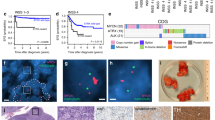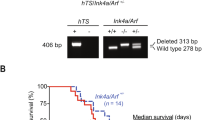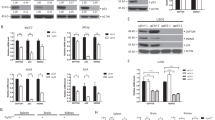Abstract
The tumor suppressor p14/p19ARF regulates Mdm2, which is known for controlling the p53 tumor suppressor. Here we report that loss of one allele of Mdm2 in cells that lack ARF resulted in a decreased rate of proliferation, fewer chromosomal aberrations, and suppression of Ras-induced transformation. Moreover, a haploinsufficiency of Mdm2 inhibited spontaneous tumor development in ARF-null mice. Remarkably, Mdm2+/−ARF−/− mice survived an average of 6 months longer than Mdm2+/+ARF−/− mice. The spectrum of tumors that arose in Mdm2+/−ARF−/− mice did not significantly differ from those that developed in mice lacking only ARF. However, the extended tumor latency allowed for the emergence of multiple primary tumors in a third of the Mdm2+/−ARF−/− mice, as compared to the single tumor type that arose in ARF-null only mice. Therefore, a decrease in Mdm2 levels restored regulation of critical cellular processes that are altered during transformation and that occur in the absence of ARF. Our findings also indicate that Mdm2 can function independently from ARF and imply that targeting Mdm2 in tumors that lack ARF expression should be an effective therapeutic approach.
This is a preview of subscription content, access via your institution
Access options
Subscribe to this journal
Receive 50 print issues and online access
$259.00 per year
only $5.18 per issue
Buy this article
- Purchase on Springer Link
- Instant access to full article PDF
Prices may be subject to local taxes which are calculated during checkout






Similar content being viewed by others
References
Alt JR, Greiner TC, Cleveland JL, Eischen CM . (2003). EMBO J 22: 1442–1450.
Alt JR, Bouska A, Fernandez MR, Cerny RL, Xiao H, Eischen CM . (2005). J Biol Chem 280: 18771–18781.
Brugarolas J, Chandrasekaran C, Gordon JI, Beach D, Jacks T, Hannon GJ . (1995). Nature 377: 552–557.
Canman CE, Lim DS, Cimprich KA, Taya Y, Tamai K, Sakaguchi K et al. (1998). Science 281: 1677–1679.
de Rozieres S, Maya R, Oren M, Lozano G . (2000). Oncogene 19: 1691–1697.
Deng C, Zhang P, Harper JW, Elledge SJ, Leder P . (1995). Cell 82: 675–684.
Dumaz N, Meek DW . (1999). EMBO J 18: 7002–7010.
Eischen CM, Weber JD, Roussel MF, Sherr CJ, Cleveland JL . (1999). Genes Dev 13: 2658–2669.
Eischen CM, Rehg JE, Korsmeyer SJ, Cleveland JL . (2002). Cancer Res 62: 2184–2191.
Eischen CM, Alt JR, Wang P . (2004). Oncogene 23: 8931–8940.
el-Deiry WS, Tokino T, Velculescu VE, Levy DB, Parsons R, Trent JM et al. (1993). Cell 75: 817–825.
Fiscella M, Ullrich SJ, Zambrano N, Shields MT, Lin D, Lees-Miller SP et al. (1993). Oncogene 8: 1519–1528.
Freedman DA, Levine AJ . (1998). Mol Cell Biol 18: 7288–7293.
Ganguli G, Wasylyk B . (2003). Mol Cancer Res 1: 1027–1035.
Garcia-Cao I, Garcia-Cao M, Martin-Caballero J, Criado LM, Klatt P, Flores JM et al. (2002). EMBO J 21: 6225–6235.
Honda R, Tanaka H, Yasuda H . (1997). FEBS Lett 420: 25–27.
Honda R, Yasuda H . (1999). EMBO J 18: 22–27.
Iwakuma T, Lozano G . (2003). Mol Cancer Res 1: 993–1000.
Jones SN, Roe AE, Donehower LA, Bradley A . (1995). Nature 378: 206–208.
Kamb A, Gruis NA, Weaver-Feldhaus J, Liu Q, Harshman K, Tavtigian SV et al. (1994). Science 264: 436–440.
Kamijo T, Zindy F, Roussel MF, Quelle DE, Downing JR, Ashmun RA et al. (1997). Cell 91: 649–659.
Kamijo T, Weber JD, Zambetti G, Zindy F, Roussel MF, Sherr CJ . (1998). Proc Natl Acad Sci USA 95: 8292–8297.
Kamijo T, Bodner S, van de Kamp E, Randle DH, Sherr CJ . (1999). Cancer Res 59: 2217–2222.
Korgaonkar C, Zhao L, Modestou M, Quelle DE . (2002). Mol Cell Biol 22: 196–206.
Llanos S, Clark PA, Rowe J, Peters G . (2001). Nat Cell Biol 3: 445–452.
Lowe SW, Sherr CJ . (2003). Curr Opin Genet Dev 13: 77–83.
Martin-Caballero J, Flores JM, Garcia-Palencia P, Collado M, Serrano M . (2004). Oncogene 23: 8231–8237.
Matheu A, Pantoja C, Efeyan A, Criado LM, Martin-Caballero J, Flores JM et al. (2004). Genes Dev 18: 2736–2746.
Mayr GA, Reed M, Wang P, Wang Y, Schweds JF, Tegtmeyer P . (1995). Cancer Res 55: 2410–2417.
McDonnell TJ, Montes de Oca Luna R, Cho S, Amelse LL, Chavez-Reyes A, Lozano G . (1999). J Pathol 188: 322–328.
Mendrysa SM, Perry ME . (2000). Mol Cell Biol 20: 2023–2030.
Mendrysa SM, McElwee MK, Michalowski J, O'Leary KA, Young KM, Perry ME . (2003). Mol Cell Biol 23: 462–472.
Montes de Oca Luna R, Wagner DS, Lozano G . (1995). Nature 378: 203–206.
Moore L, Venkatachalam S, Vogel H, Watt JC, Wu CL, Steinman H et al. (2003). Oncogene 22: 7831–7837.
O'Leary KA, Mendrysa SM, Vaccaro A, Perry ME . (2004). Mol Cell Biol 24: 186–191.
Pomerantz J, Schreiber-Agus N, Liegeois NJ, Silverman A, Alland L, Chin L et al. (1998). Cell 92: 713–723.
Quelle DE, Zindy F, Ashmun RA, Sherr CJ . (1995). Cell 83: 993–1000.
Randle DH, Zindy F, Sherr CJ, Roussel MF . (2001). Proc Natl Acad Sci USA 98: 9654–9659.
Roth J, Dobbelstein M, Freedman DA, Shenk T, Levine AJ . (1998). EMBO J 17: 554–564.
Sherr CJ . (2001). Nat Rev Mol Cell Biol 2: 731–737.
Stott FJ, Bates S, James MC, McConnell BB, Starborg M, Brookes S et al. (1998). EMBO J 17: 5001–5014.
Tyner SD, Venkatachalam S, Choi J, Jones S, Ghebranious N, Igelmann H et al. (2002). Nature 415: 45–53.
Vousden KH . (2002). Biochim Biophys Acta 1602: 47–59.
Weber JD, Jeffers JR, Rehg JE, Randle DH, Lozano G, Roussel MF et al. (2000). Genes Dev 14: 2358–2365.
Zhang Y, Xiong Y, Yarbrough WG . (1998). Cell 92: 725–734.
Zindy F, Eischen CM, Randle DH, Kamijo T, Cleveland JL, Sherr CJ et al. (1998). Genes Dev 12: 2424–2433.
Acknowledgements
We would like to thank Jane Kennedy, Silvia Plaza, and Gregg Cochran for expert technical assistance with the mice, genotyping, and immunohistochemisty, respectively, Dr Jane Meza for Kaplan–Meier analysis, Drs Hua Xiao and Timothy McKeithan for helpful discussion, Dr Guillermina Lozano for the Mdm2+/− breeder mice and Drs Martine Roussel and Charles Sherr for ARF−/− breeder mice. This work was supported by NCI grant CA098139, the Eppley Institute for Research in Cancer, and the Wanda Rizzo Memorial fund. TCG is a Mantle Cell Lymphoma grantee of the Lymphoma Research Foundation. CME is a Leukemia & Lymphoma Society Scholar.
Author information
Authors and Affiliations
Corresponding author
Rights and permissions
About this article
Cite this article
Wang, P., Greiner, T., Lushnikova, T. et al. Decreased Mdm2 expression inhibits tumor development induced by loss of ARF. Oncogene 25, 3708–3718 (2006). https://doi.org/10.1038/sj.onc.1209411
Received:
Revised:
Accepted:
Published:
Issue Date:
DOI: https://doi.org/10.1038/sj.onc.1209411
Keywords
This article is cited by
-
MDM2 promotes genome instability by ubiquitinating the transcription factor HBP1
Oncogene (2019)
-
Neuroblastoma treatment in the post-genomic era
Journal of Biomedical Science (2017)
-
MYCN sensitizes neuroblastoma to the MDM2-p53 antagonists Nutlin-3 and MI-63
Oncogene (2012)
-
Elevated Mdm2 expression induces chromosomal instability and confers a survival and growth advantage to B cells
Oncogene (2008)



